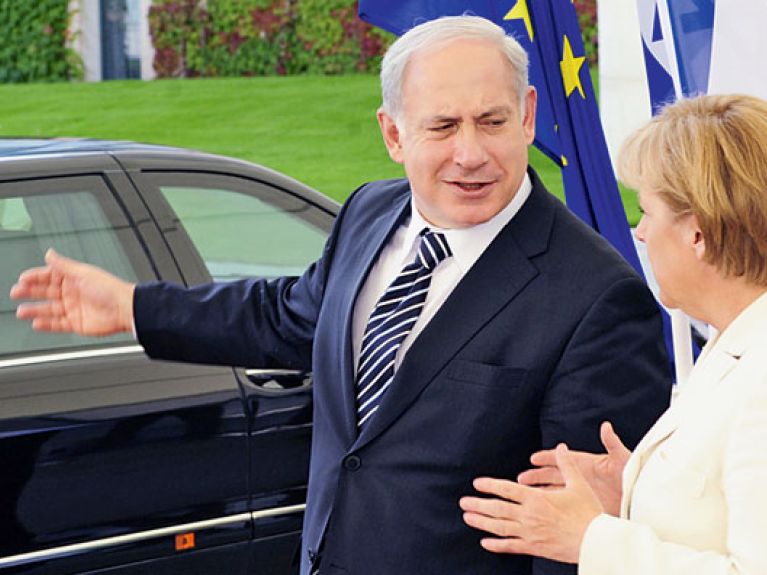Closer relations desirable
The EU and Israel are moving closer together, but relations are not as close as many in Israel would wish.

Not only do we have painful memories, but we also have a radiant future ahead of us,” said David Ben-Gurion to Gideon Rafael on his departure as the first Israeli ambassador to the European Community (EC). In February 1959, Israel and the EC (then still the European Economic Community) established diplomatic relations. Step by step, both sides have developed this relationship and consolidated it through a number of treaties: in 1975 a free trade agreement came into effect, in October 1995 the European Commission and the Israeli Government agreed to collaborate in the field of research and development, and in June 2000 an Association Agreement between Israel and the European Union (EU) came into force. Moreover, Israel was the first state with which Brussels negotiated on a plan of action within the framework of the European Neighbourhood Policy (ENP). Israel’s membership of the Union for the Mediterranean, which was set up in 2008 on the initiative of the then French President Nicolas Sarkozy, is more multilateral in its orientation.
A diversity of European voices
Yet the forging of Israeli-European links is more complex than the hundreds of agreements might suggest. Although both sides repeatedly insist that their mutual relationship is based on common values, public statements by politicians or joint declarations seldom indicate clearly what values are meant. What is more, in the EU member states and within EU institutions, the European Commission and the European Parliament, the dominant note is one of polyphony, if not considerable dissonance. This arises from the fact that Israel is seen primarily through the filter of the Middle East conflict. As a result, other facets of that country, such as its rich cultural and scientific landscape or its highly developed economy, are unduly neglected. Furthermore, negotiations on an intensification of bilateral relations between the EU and Israel, a so-called upgrade, have now been on ice for more than three years.
Germany – in demand and under pressure
The Europeans first want to see progress in the peace process before sitting down for further talks with the Israelis. At the same time, the Union itself is currently not in a position to engage more in the search for a solution to the conflict. At the moment, the political agenda in Brussels and the capital cities of the EU member states is focused too much on the economic and financial crisis.
As regards internal crisis management within the EU itself, all eyes are focused on Germany. Berlin also holds a key position regarding relations between Israel and Europe. Within the EU it is the Germans who canvas most for a strengthening of those relations – a constant feature of German foreign policy since Konrad Adenauer. The recent state visit to Israel by the new Federal President Joachim Gauck impressively illustrated this. “Germany would be the very last country to terminate its friendship and solidarity with Israel,” the former pastor and civil-rights campaigner emphasized.
Israeli majority for accession to the EU
Behaving with a similar clarity in Brussels could be more difficult for Germany in future. With the Lisbon Treaty, the EU committed itself to working for a more unified foreign policy. Positions with no majority backing in the members states would then be in danger of being softened. Policy towards Israel would be effected by this. Germany is in demand therefore as a partner of Israel and is under pressure to promote rapprochement both in Brussels and Strasbourg and in Jerusalem.
But what do Israelis actually feel when asked about Europe or the EU? It may seem surprising that the vast majority of the population of Israel does not only want closer relations with Europe, but also endorses EU membership for their country. Basically, thousands of Israelis already are part of the European Union, as they hold a passport from an EU member state. Berlin is one of the most popular travel destinations in Europe; several groups are active on Facebook under the heading “Israelis in Berlin”. Furthermore, Israeli students are increasingly considering going to European universities when planning a semester abroad. The growing demand has occasioned the Ben-Gurion University in Beersheba to set up a Bologna Training Center with support from the Konrad Adenauer Foundation Israel. Its long-term objective is to introduce a Bologna-compatible curriculum at Israeli universities. Bridges such as these could lead to the “radiant future” that over 50 years ago the founder of the state of Israel David Ben-Gurion was convinced would come about one day. ▪
Nadine Mensel works for the Konrad Adenauer Foundation Israel, where she is mainly responsible for the subjects “Sustainability” and “Europe”.
